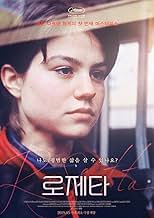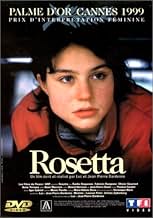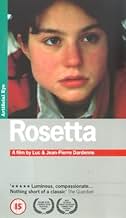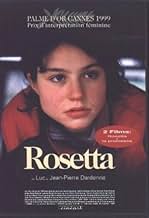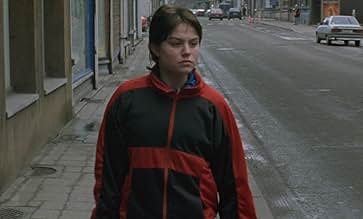Rosetta
- 1999
- Tous publics
- 1h 35m
IMDb RATING
7.4/10
17K
YOUR RATING
Young and impulsive Rosetta lives with her alcoholic mother. Moved by despair, she will do anything to maintain a job.Young and impulsive Rosetta lives with her alcoholic mother. Moved by despair, she will do anything to maintain a job.Young and impulsive Rosetta lives with her alcoholic mother. Moved by despair, she will do anything to maintain a job.
- Directors
- Writers
- Stars
- Awards
- 10 wins & 7 nominations total
Leon Michaux
- First Policeman
- (as Léon Michaux)
- Directors
- Writers
- All cast & crew
- Production, box office & more at IMDbPro
Featured reviews
Most movies try to make you feel good. Even in the most violent or despairing films the writers always provide some sort of relief, usually a character you can identify with. "Rosetta" doesn't not offer this kind of relief. It's not violent in the usual movie fashion, and it's not even as bleak or extreme or hopeless as many social films (after all, it's only the story of a teenage girl who is looking for work), it's just that there is no "this is just a movie after all" escapism. Rosetta is a brute force in motion, obsessive, relentless, and her horizon, made of concrete or muddy Belgian suburbs, is also the movie's horizon (the camera is always focused on her or on what she sees, most of the times in close-up). The war movie comparison is really accurate : "Rosetta" is shot like the first 20 minutes of "Saving Private Ryan" and she spends her time running, attacking, retreating, attacking again, followed by an omnipresent hand-held camera. At the same time, and in spite of (or because of) its reality, her character is also elliptical, hard to pity and you're not likely to love her as you can love Ken Loach's characters, for instance. This is where the movie is a tour-de-force and truly original, but obviously some viewers will have trouble to enter Rosetta's world.
I saw Rosetta 3 or 4 months ago and it has stayed vividly in my mind. I would like to respond to two other commentaries here which compare Rosetta to earlier films.
One commentary compares it to Nights of Cabiria. But this is no pastoral fantasy like the Fellini. Another contributor calls Rosetta a fake Bresson. Presumably the point of comparison is with Bresson's Mouchette, and it's a good comparison to make, but I don't think it is one that diminishes Rosetta. Both Mouchette and Rosetta capture the flow of time and the characters' interior worlds realistically, but with realisms which are quite different. Mouchette's struggle is a spiritual one; Rosetta's struggle is with her physical conditions.
To make a comparison of my own, albeit an off-the-wall one, Rosetta's determination is strangely like the pure will-power that Lee Marvin demonstrates, barging into the Organisation's HQ in Point Blank. Maybe this forceful quality is what makes it a "war film".
The film-makers do the opposite of sentimentalising Rosetta's conditions as Fellini would have done. Arguably, they even go past Bresson, if you tend to a materialist rather than a religious point of view. They argue how poverty operates, how surviving it involves anger.
There is one moment when Rosetta slips in a lake and we understand exactly at the moment she does, that she may in fact drown. Not a moment that's easy to forget.
One commentary compares it to Nights of Cabiria. But this is no pastoral fantasy like the Fellini. Another contributor calls Rosetta a fake Bresson. Presumably the point of comparison is with Bresson's Mouchette, and it's a good comparison to make, but I don't think it is one that diminishes Rosetta. Both Mouchette and Rosetta capture the flow of time and the characters' interior worlds realistically, but with realisms which are quite different. Mouchette's struggle is a spiritual one; Rosetta's struggle is with her physical conditions.
To make a comparison of my own, albeit an off-the-wall one, Rosetta's determination is strangely like the pure will-power that Lee Marvin demonstrates, barging into the Organisation's HQ in Point Blank. Maybe this forceful quality is what makes it a "war film".
The film-makers do the opposite of sentimentalising Rosetta's conditions as Fellini would have done. Arguably, they even go past Bresson, if you tend to a materialist rather than a religious point of view. They argue how poverty operates, how surviving it involves anger.
There is one moment when Rosetta slips in a lake and we understand exactly at the moment she does, that she may in fact drown. Not a moment that's easy to forget.
Have you seen the 1948 Italian classic "Bicycle Thieves"? Yeah think that, pumped up on crack. This is "Italian neorealism" but set in Belgium a half century later.
The character "Rosetta" is a 16-year-old girl who lives in a camper with her nearly catatonic, alcoholic mother and is, as the filmmakers say, "a thin aluminum wall away from living on the streets". The fact that Rosetta is barely an adolescent who is thrust into the role of provider and responsible adult is a clever twist that further turns this social statement upside down. It becomes not just a tale of survival but terrifyingly a coming-of-age flick. Rosetta is socially and emotionally stunted, unfinished and handicapped. It's fascinating to see Rosetta (excellently played by Émilie Dequenne who won Best Actress at Cannes) attempting to grasp concepts of morality and ethics even though she has clearly had no guidance. There is a certain wild animal quality to her which you will immediately feel, and though she is tough and headstrong, she is still just a teenager who doesn't know how to dance, doesn't know what a "friend" is, and whose only reality consists of obsessively trying to find a legitimate job because she feels that's the coveted symbol of having a normal life.
In that respect, this film provides something we can all apply to our lives whether we're 16-year-old homeless kids or rising corporate execs. It's the idea that an obsessive pursuit of some type of social status, or social achievement, or even a relationship, is what we cling to as proof that we have a "normal life".
In a memorable scene our protagonist Rosetta talks herself to sleep by whispering, "Your name is Rosetta. My name is Rosetta. You found a job. I found a job. You've got a friend. I've got a friend. You have a normal life. I have a normal life. You won't fall into the abyss. I won't fall into the abyss. Good night. Good night."
The camera remains very tight, almost claustrophobically so, on Rosetta throughout the entire film which exaggerates the microscopic world she lives in. She repeats routines and engages in trivial labors which are shown to us in almost tedious repetition, but the effect is powerful in conveying a sense of quiet, lonely desperation.
Throughout the history of cinema, there have been many films that document "how the other half lives" but most of them approach the subject as if we are spectators, almost in a patronizing or voyeuristic way that leaves us thinking after the credits roll "phew I'm glad that's not me" but here in "Rosetta" we get a sense that the bizarre life of this 16 year old outcast might very well be the story of the human race.
The character "Rosetta" is a 16-year-old girl who lives in a camper with her nearly catatonic, alcoholic mother and is, as the filmmakers say, "a thin aluminum wall away from living on the streets". The fact that Rosetta is barely an adolescent who is thrust into the role of provider and responsible adult is a clever twist that further turns this social statement upside down. It becomes not just a tale of survival but terrifyingly a coming-of-age flick. Rosetta is socially and emotionally stunted, unfinished and handicapped. It's fascinating to see Rosetta (excellently played by Émilie Dequenne who won Best Actress at Cannes) attempting to grasp concepts of morality and ethics even though she has clearly had no guidance. There is a certain wild animal quality to her which you will immediately feel, and though she is tough and headstrong, she is still just a teenager who doesn't know how to dance, doesn't know what a "friend" is, and whose only reality consists of obsessively trying to find a legitimate job because she feels that's the coveted symbol of having a normal life.
In that respect, this film provides something we can all apply to our lives whether we're 16-year-old homeless kids or rising corporate execs. It's the idea that an obsessive pursuit of some type of social status, or social achievement, or even a relationship, is what we cling to as proof that we have a "normal life".
In a memorable scene our protagonist Rosetta talks herself to sleep by whispering, "Your name is Rosetta. My name is Rosetta. You found a job. I found a job. You've got a friend. I've got a friend. You have a normal life. I have a normal life. You won't fall into the abyss. I won't fall into the abyss. Good night. Good night."
The camera remains very tight, almost claustrophobically so, on Rosetta throughout the entire film which exaggerates the microscopic world she lives in. She repeats routines and engages in trivial labors which are shown to us in almost tedious repetition, but the effect is powerful in conveying a sense of quiet, lonely desperation.
Throughout the history of cinema, there have been many films that document "how the other half lives" but most of them approach the subject as if we are spectators, almost in a patronizing or voyeuristic way that leaves us thinking after the credits roll "phew I'm glad that's not me" but here in "Rosetta" we get a sense that the bizarre life of this 16 year old outcast might very well be the story of the human race.
I found this film quite effecting without ever straying into crass sentimentality. Rosetta is a young girl who is full of anger and yearning. She lives with a dysfunctional alcoholic mother in a caravan park. Little is given about her past but we can understand that due to her upbringing she has limited options available to her. Her desire to be find a job (any job) is both desperate and touching. For Rosetta the prospect of a job, even a job that many in middle class society (indeed the average art house cinema goer!) might regard as mundane and without prospects, represents to her a chance to escape the existence on the outskirts of society. Her drive however raises her above the mere status of victim, and it is a credit to the lead that she conveys so much of this, without it having to be spelt out.
One thing I did find a little disconcerting was the wobbly camera technique, don't see if you are feeling a little nauseous as I was however this is only a minor criticism. Its around 90 minutes and I think well worth the investment if you like a good character based movie.
One thing I did find a little disconcerting was the wobbly camera technique, don't see if you are feeling a little nauseous as I was however this is only a minor criticism. Its around 90 minutes and I think well worth the investment if you like a good character based movie.
I saw "Rosetta" several weeks ago - and I still fail to recall any movie which could convey such an immediate sense of being pysically there, all the time along Rosetta's everydays' "war". We are bombarded and flooded with images 16hours per day, it takes great stregth of vision, of images, atmosphere and characters to grab at you this effectively in year 2000! Rosetta struck my as a very real encounter, with all the nonsense and ups / down of real events and life... It made me feel more of life, made me think of it more often and more intensely, it made me look into more eyes than I did before... Thank you, Luc and Jean-Pierre! and thank you, Emilie and all!
Did you know
- TriviaContrary to popular belief, the film did not inspire a new so-called "Rosetta Law" in Belgium that prohibited employers from paying teen workers less than the minimum wage and included other youth labour reforms. In a Guardian interview with the Dardenne brothers, Jean-Pierre explained the misconception: "No, that law already existed, it just hadn't been voted through yet. The truth is always less interesting than the fiction."
- GoofsWhen Rosetta is giving her mother money for a water bill she is wearing a jacket with the sleeves fully extended. However in the next immediate cut when she goes outside the sleeves are rolled up.
- SoundtracksSomething New
- How long is Rosetta?Powered by Alexa
Details
- Release date
- Countries of origin
- Official site
- Language
- Also known as
- Розетта
- Filming locations
- Production companies
- See more company credits at IMDbPro
Box office
- Gross US & Canada
- $266,665
- Opening weekend US & Canada
- $20,187
- Nov 7, 1999
- Gross worldwide
- $293,092
Contribute to this page
Suggest an edit or add missing content


![Watch Bande-annonce [OV]](https://m.media-amazon.com/images/M/MV5BOWY4MGMzYTItZjQwOS00MmVhLWE0MDYtMGZmYmFjNTkyYTU2XkEyXkFqcGdeQXRyYW5zY29kZS13b3JrZmxvdw@@._V1_QL75_UX500_CR0)


